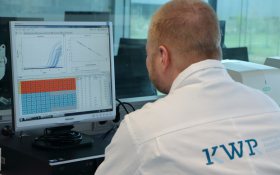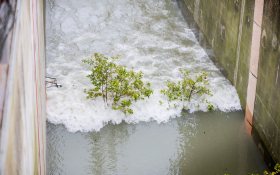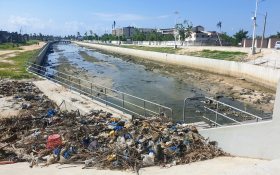Finish Mondial studies role out of Wash-concept to Bangladesh
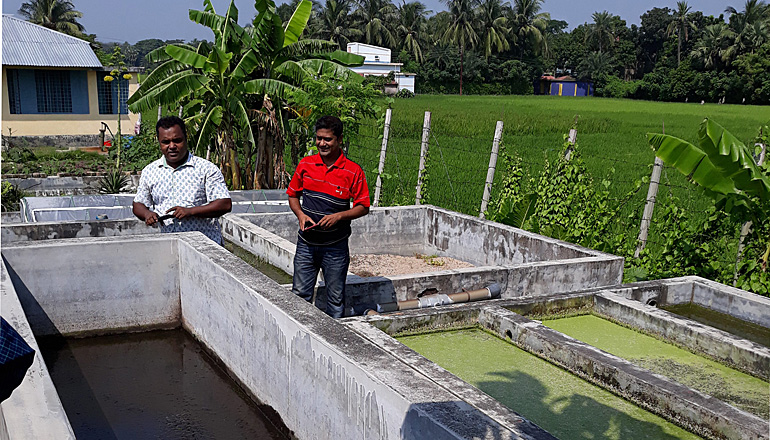 Early October, Program Manager Astrid van Agthoven of the Finish partnership visited Bangladesh for an update on the faecal sludge management. Following the successful facilitation of WASH services in India (since 2009) and Kenya (since 2013), the Finish partnership, by Dutch non-profit organisations Waste, Amref Flying Doctors and Aqua for All is gradually expending to other countries in Asia and Africa.
Early October, Program Manager Astrid van Agthoven of the Finish partnership visited Bangladesh for an update on the faecal sludge management. Following the successful facilitation of WASH services in India (since 2009) and Kenya (since 2013), the Finish partnership, by Dutch non-profit organisations Waste, Amref Flying Doctors and Aqua for All is gradually expending to other countries in Asia and Africa.
A small, practical start has been made in Satkhira where people use pit latrines or septic tanks that are often overflowing or discharged into storm water drains. The current capacity of the sludge treatment facility is too little to serve all 200,000 citizens.
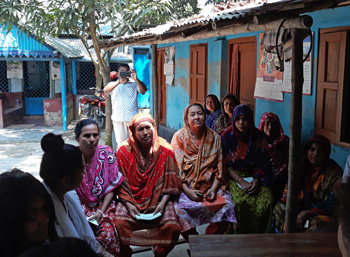 Initial consultations in Satkhira, Bangladesh, showed that the current treatment capacity for faecal sludge in this city is far too little.
Initial consultations in Satkhira, Bangladesh, showed that the current treatment capacity for faecal sludge in this city is far too little.
Stakeholder consultation
Program Manager Astrid van Agthoven reports on her visit: ‘After an initial broad stakeholder consultation early July, the core group of partners gathered at end of September in Satkhira municipality in the South West to further discuss the plans we made.'
‘Compared to India and Kenya,’, she continues, ‘Bangladesh has already reached an impressive level of access to sanitation, and microfinance loans for sanitation are quite common. Therefore, we focus in Bangladesh on faecal sludge management.’
Overflowing put latrines
In Satkhira town there is no sewage system and people use pit latrines or septic tanks that are often overflowing or discharged into storm water drains.
UK non-profit organisation Practical Action built a small faecal sludge treatment demonstration site a few years ago which can unfortunately only process the waste of about 30-40 households per month.
With more than 200,000 people in the municipality, there should be a capacity for treating the waste of at least 650 households per month.
One step at a time
Van Agthoven: ‘That’s when we assume each pit/septic tank will need to be emptied every 5 years. Though in a flood prone area like Satkhira, it would be much better if pits are emptied every year! But let’s take one step at a time.’ According to Van Agthoven the current situation implies that almost all faecal sludge of Satkhira ends up in the environment untreated.
Finish was invited to visit Bangladesh by microfinance institution ASA.
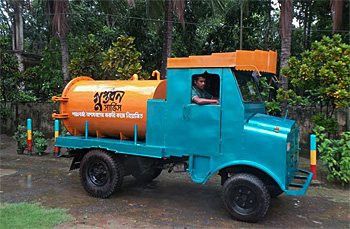 Practical Action has built this affordable ‘sludge transporter (1.5 cum capacity) for the Sweepers Association of Faridpur municipality. The mechanised transporter is able to access narrow roads (source: Facebook Practical Action).
Practical Action has built this affordable ‘sludge transporter (1.5 cum capacity) for the Sweepers Association of Faridpur municipality. The mechanised transporter is able to access narrow roads (source: Facebook Practical Action).
Unorganized informal sector
Like in other countries, the idea is to develop Finish Bangladesh as a public-private partnership. The workshop was a very useful starting point in terms of building such a partnership. However, the private sector was not well represented, as currently desludging is done by the informal sector that is not well organized.
Finish aims at facilitating people who are involved in pit emptying to enhance their business by increasing their market and making their work more dignified, e.g. through proper equipment that will ease their job and protect their health.
In addition, the treatment of waste and turning it into usable products – a sector in which currently hardly anybody is employed – is also a good opportunity to enhance livelihoods for vulnerable populations.
This news item was originally published on the website of Aqua for All.
(Top photo: Current faecal sludge treatment faciloity in Satkhira, Bangladesh - photo's: Aqua for All).
Read also on this website
● Stockholm world water week 2018: Water.org joins Finish Mondial to team up for affordable toilets worldwide, 31 August 2018
● Three Dutch NGOs sign mondial agreement to scale up sanitation projects, 1 June 2018
● Expertise: Water for all
● Country: Bangladesh
More information
Finish Mondial
c/o Waste
The Hague, the Netherlands
+31 70 205 10 25
www.waste.nl/finish
